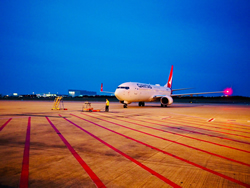 The Commonwealth Scientific and Industrial Research Organisation (CSIRO) has taken wastewater surveillance to new heights by testing samples from long haul flights of returning Aussies for SARS-CoV-2, for the virus which causes COVID-19.
The Commonwealth Scientific and Industrial Research Organisation (CSIRO) has taken wastewater surveillance to new heights by testing samples from long haul flights of returning Aussies for SARS-CoV-2, for the virus which causes COVID-19.
Lead author of the study and Senior Research Scientist at CSIRO, Warish Ahmed said the research undertaken in partnership with the University of Queensland and Qantas, proved that wastewater analysis could detect the SARS-CoV-2 virus before passengers showed symptoms.
“As global travel returns, wastewater testing of flights can be an effective way to screen incoming passengers for COVID-19 at points of entry,” Dr Ahmed said
“It provides an extra layer of data, if there is a possible lag in viral detection in deep nasal and throat samples and if passengers are yet to show symptoms,” he said.
“The rapid on-site surveillance of wastewater at points of entry may be effective for detecting and monitoring other infectious agents that are circulating globally and provide alert to future pandemics.”
Dr Ahmed said the study analysed wastewater samples from lavatories of 37 Australian Government repatriation flights from COVID-hotspots including India, France, the UK, South Africa, Canada and Germany between December 2020 and March this year.
He said the wastewater samples from 24 of the 37 repatriation flights (65 per cent) showed a positive signal for SARS-CoV-2, despite all passengers (except children under age five) testing negative to the virus 48 hours before boarding.
“Infected people shed the virus in their faeces about two to five days before showing symptoms,” he said.
“Traces of COVID can also be detected in wastewater from people who were previously infected, still shedding the virus, but are no longer infectious to others (although this is typically a weaker signal).”
Dr Ahmed said this was the first official study of wastewater from Australian repatriation flights travelling from COVID-19 hot spots and the first time researchers had matched the plane wastewater testing with the follow-up clinical data testing of passengers in quarantine.
The CSIRO study can be accessed on the Environment International website at this PS News link.


